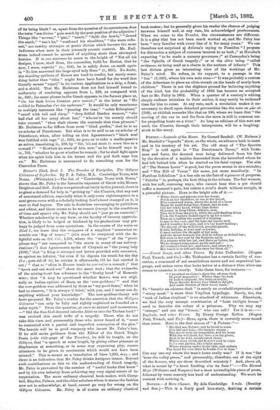Homer's Iliad, Book I The Troades of Euripides. The CEdipus
Coloneus of Sophocles. By F. A. Paley, M.A. Cambridge Texts, with Notes. (Whittaker.)—The list of "Cambridge Texts with Notes," shows that Mr. Paley is the favourite exponent of Greek with Messrs. Deighton and Bell. And as was pointed out lately in this journal, there is so great a demand for help in "getting up" the Classics, that any sort of annotated edition, especially when it only costs eighteenpence in a neat green cover with a scholarly-looking fowl's head stamped on it, is sure to find buyers. The sale is doubtless encouraging to publishers and editor, and there seems to be no reason (except in the conditions of time and space) why Mr. Paley should not "just go on careerin'." Whether scholarship in any form, or the faculty of literary apprecia- tion, is likely to be helped or hindered by his productions may per- haps be judged from some quotations. In the course of the notes on Iliad I., we learn that the tr-ripawra of a suppliant "somewhat re- semble our flag of truce ;' " (this must be compared with the de- lightful note on (Ed. Col., 1,591, where the " steps " of the "preci- pitous way" are compared to "the stairs in many of our railway. stations ;") that Agamemnon spoke of Chryseis as "the young lady (109)," that "a King is stronger and better provided with resources, as against an inferior, for even if he digests his wrath for the day (i.e., gets rid of it), he retains it afterwards, till he has carried it out;' " that re "often in Homer tends to gen.ralise a remark ;" that "Iteerb and our word war" show the same root ; that the 0-44IacrOal of the mixing-bowl has reference to the "frothy head" of Homeric wine ; that "it may be questioned whether Boris was not origi. nally an Indian epithet of Hera, as the cow-goddess ;' " and that the cow-goddess was addressed by Zeus as "my good dame," when he had to observe, "It is always 'I think,' with you, and I never can do anything without your knowledge." The cow-goddess-theory will have prepared Mr. Paley's reader for the assertion that the (Edipus Coloneus "can only be fully and rightly explained as founded on a solar myth." From the question, at once so natural and momentous, —" Did the Sun-God descend into the Attic or into the Theban land ?'' was evolved this small trifle of a tragedy. Those who do not take this view, and presumably those who never heard of it, "must be contented with a partial and imperfect conception of the plot." The heretic will be in good company who incurs Mr. Paley's ban. If he still seeks guidance from the Editor of the Greek Tragic Poets (ride title.page of the Troades), he will be taught, on the Edipus, that "a speech at some length, by giving either pleasure or displeasure at something, or in some way expressing pity, causes utterance to be given to sentiments which would not have been uttered." This is meant as a translation of lines 1,281, seqq. ; and there is no indication that Mr. Paley thinks Antigone insane. Beyond such contributions as this to the understanding of Greek tragedy, Mr. Paley is prevented by the number of "useful books that know" and by his own industry from achieving any very signal errors of in- terpretation. The mere ordinary classical book-maker, with Camp- bell, Blaydes, Palmer, and the elder scholars whom it seems the fashion now not to acknowledge, at hand, cannot go very far wrong on the tEdipus Colonise. Mr. Paley is of course no ordinary classical book-maker; but he generally gives his reader the chance of judging between himself and, at any rate, his acknowledged predecessors. When we come to the Troades, the circumstances are different. It is a play that has not been much worked at, and Mr. Paley has been "very familiar with every line of it for many years." We are therefore not surprised at Athena's saying to Poseidon "I propose for discussion a subject of common interest to us both ;" at Hecuba's expecting "to be made a nursery governess ;" at Cassandra's being "the Ophelia of Greek tragedy ;" or at the olive being "called aniraaror, as being used as a charm in the nurture of infants." This last dictum gives an interesting view of the workings of Mr. Paley's mind. He refers, in its support, to a passage in the " Ion " (1,433), where his own note runs—" It was probably a custom of the Athenians to place an olive-wreath on the heads of newly-born children." There is not the slightest ground for believing anything of the kind, but the probability of 1858 has become an accepted fact to Mr. Paley in 1882. When a quarter of a century's editing simply endears mistakes to their author, it may surely be reckoned time for him to cease. At any rate, such a revelation makes it un- necessary to dwell upon detached perversities like the note on las ot, (709), or childish remarks like that on 180, where we learn that "the moving of the oar to and fro from the stern is still in common use for propelling boats on a river." As long as editions of this sort are used, the Classics, through their interpreters, will be a laughing- stock to the many.


































 Previous page
Previous page